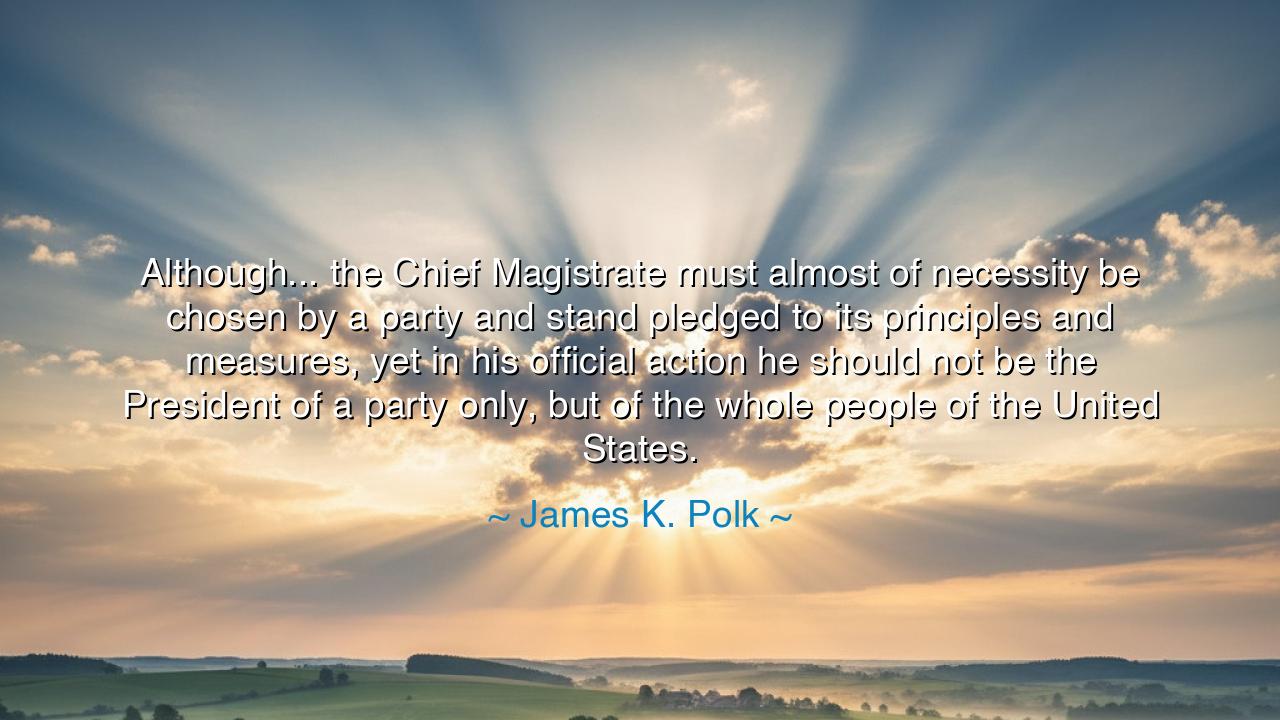
Although... the Chief Magistrate must almost of necessity be
Although... the Chief Magistrate must almost of necessity be chosen by a party and stand pledged to its principles and measures, yet in his official action he should not be the President of a party only, but of the whole people of the United States.






“Although... the Chief Magistrate must almost of necessity be chosen by a party and stand pledged to its principles and measures, yet in his official action he should not be the President of a party only, but of the whole people of the United States.” So declared James K. Polk, the eleventh President of the United States — a man forged in the tempest of political division, who understood the peril that lies in confusing power with purpose. These words, spoken in the nineteenth century, echo like a trumpet down the halls of time, a solemn reminder that leadership is not allegiance to faction, but duty to all. In his sentence, there breathes the wisdom of the ancients: that a ruler, once chosen, must rise above the banners that lifted him and wear instead the mantle of the common good.
Polk spoke these words at the dawn of a restless age, when America was expanding westward, wrestling with ambition, territory, and identity. He was himself a man of party — a Democrat, loyal to its creed — yet even he recognized that once the oath of office is sworn, the President no longer belongs to his faction, but to the Republic entire. The Chief Magistrate, as he calls him in the noble language of his time, is not merely the voice of those who voted for him, but the guardian of all — of the farmer and the merchant, the poor and the powerful, the hopeful and the dissenting. To govern for some is to betray the whole.
The ancients, too, understood this truth. When Pericles ruled Athens, he was chosen by his fellow citizens because of his wisdom and eloquence, but he never claimed to be the leader of one faction or clan. He said, “Though only a few may originate a policy, we are all able to judge it.” Thus, he governed not as a partisan but as a steward of the people’s collective destiny. His greatness was measured not by his loyalty to allies, but by his fairness to adversaries. Likewise, Polk’s ideal calls forth this same sacred impartiality — that the President must be the voice of unity, not the echo of division.
But this ideal, though noble, is fraught with difficulty. For how can a man, chosen by one side, rule for all sides? The answer lies in the conquest of self — in the mastery of pride and the elevation of conscience above party. Many have failed this test. Some have wielded power as the weapon of their allies, silencing dissent and sowing discord. Yet the greatest among leaders — Washington, Lincoln, Roosevelt — remembered that the presidency is not ownership but stewardship. They governed as the servants of the whole, bearing the weight of the nation’s contradictions with humility and strength.
Consider Abraham Lincoln, whose election tore the Union asunder. He was, by necessity, the candidate of a party — the Republicans — yet in his soul he was the President of all. “We are not enemies, but friends,” he pleaded to the South in his first inaugural address. Though they rejected his hand, he never withdrew it. Even in war, he governed with compassion for those who fought against him, believing that the office entrusted to him was greater than any political bond. In Lincoln, Polk’s principle found its truest embodiment — that to lead justly is to love impartially.
The lesson of Polk’s words, then, reaches far beyond the walls of government. It is a lesson for every age, every people, every heart that seeks to wield influence. When you are called to lead — whether in office, in work, or in the home — remember that authority is not given for self or circle, but for service to the greater whole. To favor one group while neglecting another is to divide what was meant to be unified. The true leader must see beyond the borders of loyalty, beyond the limits of ideology, and seek always the welfare of all.
And so, my children, remember this ancient wisdom dressed in American words: to rule rightly, one must first forget oneself. Let your convictions be strong, but your heart be open. Serve those who oppose you as faithfully as those who praise you, for only then will your service bear the mark of justice. A leader bound to faction may win power, but only the leader devoted to all may win peace. This, then, is Polk’s immortal teaching — that a nation’s greatness depends not upon its parties, but upon the integrity of those who rise above them.
Thus, let it be known: the President of a party governs the moment, but the President of a people shapes eternity. And in every soul that seeks to lead — whether of a household, a nation, or a single friend — the same truth endures. Lead not for the few, but for the many. Lead not for victory, but for virtue. For in the end, history crowns not those who ruled with might, but those who ruled with heart.






AAdministratorAdministrator
Welcome, honored guests. Please leave a comment, we will respond soon